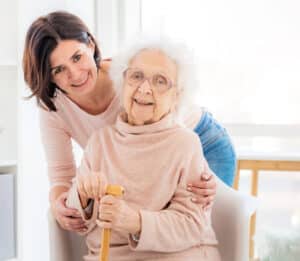If you are providing caregiving services for a sick or elderly loved one for free (or are thinking about doing so), Missouri has a program that allows you to get paid as a personal caregiver.
This article will cover what being a CDS caregiver entails and what your options are for receiving compensation.

Why would someone need a caregiver?
Those who are disabled, elderly, and/or sick require the help of a caregiver. This may be for a variety of reasons. Here are a few of the most common ones:
- The patient is recovering from an illness or surgical procedure.
- They have to stay in bed due to a disability or sickness.
- The person being cared for wants encouragement or support to get up and move around.
- An elderly or injured individual is at risk of falling when they complete day-to-day tasks, such as cooking and cleaning.
- The patient needs incontinence care. To clarify, this means that they can’t control their bladder and, as a result, must rely on someone to assist them with going to the bathroom.
- An ill person requires an escort to take them to their doctor appointments.
You can add to that any other reason that makes it difficult or impossible for those who are disabled, elderly, and/or sick to adequately take care of their personal care needs.
For example, people who are being cared for by their spouse may want to give them a break by hiring a professional caregiver.

What is a CDS caregiver?
Under the consumer directed services (CDS) program, which is offered through Medicaid, Missourians could hire family members or friends as their personal caregivers or care providers.
You may want to consider this option if you already provide care to a loved one who is on Medicaid.
This is because Medicaid will pay you for assuming this caregiving role and taking on the responsibility of supporting your sick/elderly family member or friend, just as a professional caregiver would.
What are the basic tasks of a CDS caregiver?
The following are among the main duties of a CDS caregiver:
- Appointments: This entails taking the patient to and from the doctor.
- Bathing: Assisting your loved one with taking a bath.
- Bathroom Needs: Your family member or friend might need help with going to the bathroom, especially if they have a medical condition that impacts their ability to do so.
- Cleaning: If your loved one is disabled or has difficulty moving around, Medicaid will also pay you for cleaning their home or apartment.
- Companionship: Simply put, a companion is necessary for a sick person’s psychological well-being.
- Cooking: Some patients may require you to cook them three meals per day, while others might only want assistance with a specific one, such as dinner.
- Dressing: If your loved one has a disability that affects their ability to move, they will rely on you to take out their clothing and get them dressed.
- Entertainment: Examples of this include taking your friend or family member to a movie theater or live show, turning on their TV (when they can’t walk), and even having conversations that keep them entertained.
- Feeding: In addition to cooking, those with certain disabilities may rely on a caregiver when they can’t feed themselves.
- Help Moving Around: For instance, grabbing your loved one’s walker, holding their hand while they move around their residence, and pushing their wheelchair.
- Laundry: The relevant tasks are sorting, washing, and hanging up the patient’s clothing.
- Medication Management: As a caregiver, you want to make sure that your friend or family member takes their medicines on time and doesn’t miss any doses.
- Physical Therapy: You might have to drive the sick or disabled individual to their appointments or help them complete physical therapy exercises at home.
- Shopping: You can buy their groceries and household goods for them, which is even more important when the person that you’re caring for has a special diet.
Completing these tasks and duties requires some necessary skills and personal attributes.

Qualities Needed to Be an Elderly Caregiver
Because of the delicate role that elderly caregivers play, they must have the following skills and characteristics to efficiently take care of a patient:
- Determination
- Emotional intelligence
- Empathy
- A giving attitude and mentality
- The ability to multitask and balance between various tasks
- Initiative-taking
- Patience
- Positivity
- A sense of humor
Most of these skills are incredibly valuable while taking care of your elderly or sick loved one. In light of this, there are plenty of programs that will pay you to be your friend or family member’s caregiver.
How can in-home caregivers be paid?
Here are your options for getting reimbursed for your work as an in-home caregiver:
- Medicaid: As previously mentioned, Medicaid’s CDS caregiver program allows recipients to hire and pay their family members or friends.
- Long-term Insurance: Depending on the patient’s insurance plan, the policy might cover their cost of hiring someone that they know as an in-home caregiver.
- Private Pay: Simply put, your loved one would pay you directly for your services.
- Workers’ Comp: If your friend or family member got injured while performing their job duties and are insured by the employer’s workers’ comp policy, you should check if their plan covers the services of an in-home caregiver.
- Veteran Benefits: As long as you meet the Veterans Affairs (VA) requirements and have documented proof of a disability or illness, your benefits could take care of the cost of hiring someone you know to be your caregiver.
In short, you have several options for getting compensated for your work as a friend or family member’s caregiver. If your loved one has Medicaid, your best bet might be to go through the CDS caregiver program.
How to become a CDS caregiver in Missouri?
You want to check out FreedomCare MO to start the process of becoming a paid caregiver for the elderly in Missouri.
The requirements are simple. In fact, you don’t even need to attain any certifications or undergo training.
As long as you’re at least 18 years old, live in the Kansas City, St. Louis, or Springfield area, and have gotten a TB shot, you are eligible to be a CDS caregiver.
Share This Article